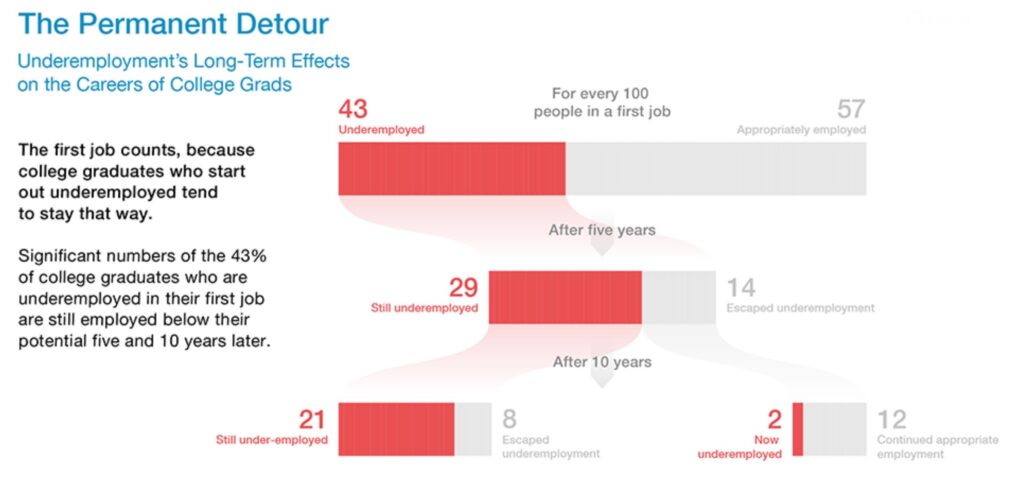Underemployment: Research on the Long-Term Impact on Careers
We are recreating the results of the research conducted by Burning Glass Technologies to explore how college majors influence underemployment and identify ways to help prevent it. Their goal was to provide students, parents, counselors, and higher education institutions with data-driven strategies to ensure student success.

Introduction
A bachelor’s degree has been, and continues to be, the clearest and most accessible path to a good job and middle-class wages. Over the course of a lifetime, the average college graduate makes $1 million more over a career than a worker with just a high-school diploma.
Yet that powerful advantage only pays off if graduates find college-level jobs. In recent years, far too many students find that they are not able to put their degree to work in the labor market, with a troubling impact on their earning potential.
Majors that Matter: Ensuring College Graduates Avoid Underemployment
Underemployment is a pervasive problem among recent college graduates, and it is easier to avoid than escape. In our followup report, we find the the choice of major is crucial. Overall, 43% of college graduates are underemployed in their first job. When examined by major, underemployment rates vary by 50 percentage points, from 29% in engineering to 80% in personal and culinary services, a more than twofold difference in risk.
The report includes a three-part strategy for students who want to avoid underemployment, and educators who want to ensure student success:
Evaluate the Underemployment Risk when Choosing a Major: While STEM majors outperform others, there are good choices for students in all fields. But many of these majors, including popular majors such as business, legal studies, and public administration, have some of the highest underemployment rates. This is troubling because these non-licensed occupational majors account for 4 in 10 bachelor’s degrees awarded in the United States. Since 1970, the enrollment of students in these majors has increased 80%, compared to an 11% increase for STEM majors and a one-third decline in liberal arts majors.
Avoid Underemployment by Building the Skills to Succeed: For all college majors, the acquisition of specific workplace skills can add up to 20% to a college graduate’s earnings. Students in underperforming majors can significantly improve their prospects by selecting a high-demand specialization. Underemployment for business majors overall is 47%, but lower for those with specializations in finance (33%) or marketing (41%).
Accrue Meaningful and Relevant Work Experiences Before Graduation: Internships and other work experience programs can provide students with an opportunity to build skills. For example, college graduates who become athletic trainers can both reduce their risk and earn a salary premium if they have experience in rehabilitative services.
The Permanent Detour: Underemployment’s Long-term Effects on the Careers of College Graduate
Those who start out behind tend to stay behind. Our research found four in 10 college graduates are underemployed in their first job. Two-thirds of these graduates will still be underemployed five years later. Of those workers underemployed at five years, three-quarters will still be without college-level work at the 10-year mark.